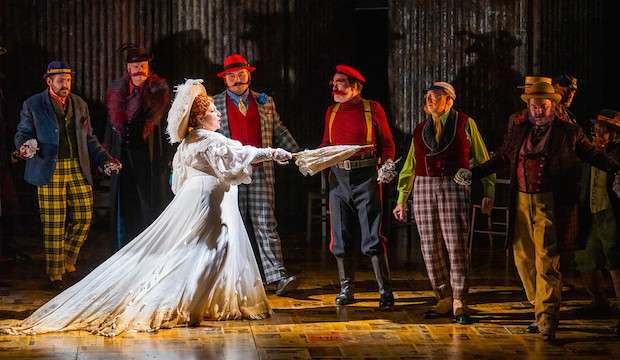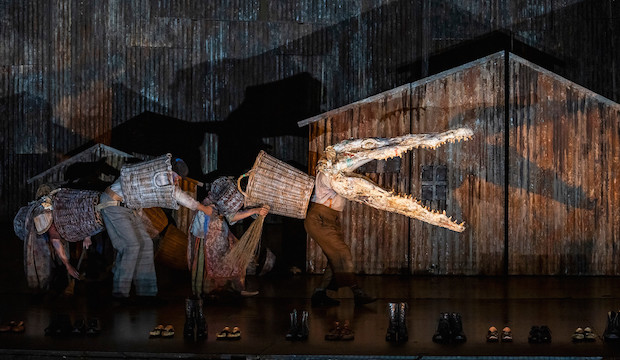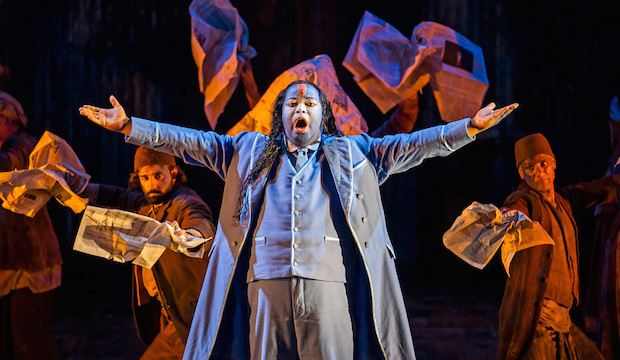Satyagraha, English National Opera review ★★★★★
Colossal production of Philip Glass's opera about Mahatma Gandhi returns to kickstart the new ENO season
Sean Panikkar is Gandhi in Satyagraha at English National Opera. Photo: Tristram Kenton
'This opera is about how ordinary people coming together can change the world.' So said Annilese Miskimmon, English National Opera's new artistic director, addressing a first night audience that was as delighted to be back at the Coliseum, after 18 months away, as the huge company was to get stuck in.
Philip Glass's Satyagraha may have been written more than 40 years ago, but its messages about grassroots action and about the vulnerability of those who campaign for others feel more pertinent than ever, against the backdrop of climate crisis and, one day after opening night, an MP's brutal death.
In Satyagraha we join the long slow march of Mahatma Gandhi to the emancipation of Indian people, other freedom movements walking alongside. Gandhi steps out of the shadows of Russian writer Leo Tolstoy, with his concern for the deprivations of peasantry, of poet and thinker Rabindranath Tagore, and exerts his own influence on Martin Luther King, in his fight against apartheid.

Sarah Pring as Gandhi's friend Mrs Alexander, who tackles his detractors. Photo: Tristram Kenton
These three figures loom over the production by Phelim McDermott whose Improbable physical theatre company first collaborated on Satyagraha in 2007, for the opera's UK premiere. Then and now, this is ENO at its best, ambitious in scale, broad in its thinking, multicultural, multimedia.
For this second revival, the American tenor Sean Panikaar makes the most impressive Gandhi, solemn and determined, embarking on his long journey from an early career in law in South Africa to world statesman. Along the dangerous way he is mocked and vilified, most vividly by a line of self-satisfied men, harrumphing and snorting over their newspapers. It takes a Gandhi supporter, fearless Mrs Alexander (an indomitable Sarah Pring) to give them what for.
Glass's music is like the sun. You cannot detect its movement from moment to moment, but as rhythms and note patterns unfold imperceptibly, you realise that the beam is now a different place. It has the generosity of the natural world in its repetitions and multiplicity, seductive to the ear and requiring fantastic musicianship.

Improbable's theatrical effects are created with everyday objects. Photo: Tristram Kenton
With superbly well-matched soloists and the mighty Orchestra and Chorus of English National Opera, Carolyn Kuan, making her ENO conducting debut and with a proven track record performing Philip Glass, made a huge impression on a rapturous audience.
Among the standout singers, Musa Ngqungwana making his ENO debut as lordly Krishna, Sarah Pring as no-nonsense Mrs Alexander, Ross Ramgobin as Prince Arjuna and Grabriella Cassidy as Gandhi's secretary Mrs Schlesen.
With a libretto in Sanskrit, all the meaning comes from the music, drama and inventiveness of Improbable, who create a whole world out of everyday objects – newspapers, sticky tape, baskets. Larger-than-life puppetry, Paule Constable's warm lighting, and Kevin Pollard's costumes complete the ever-changing scene.

Musa Ngqungwana is Krishna. Photo: Tristram Kenton
Characters' hems are besmirched, as if to say, no one goes untainted by the imperfections of the society they move in. But, as Miskimmon pointed out, that society can change. So can an opera company. A production on this massive scale kickstarts ENO after months in the performance doldrums, but its work outside the opera house was notable, with open air performances and health projects.
Ahead, a Gilbert and Sullivan satire, HMS Pinafore, and Wagner's galloping Valkyrie. Looks promising, sounds promising. Go ENO!
Satyagraha is sung in Sanskrit with occasional text in English. Performances are on 16, 17, 20, 23, 27 and 28 October
Philip Glass's Satyagraha may have been written more than 40 years ago, but its messages about grassroots action and about the vulnerability of those who campaign for others feel more pertinent than ever, against the backdrop of climate crisis and, one day after opening night, an MP's brutal death.
In Satyagraha we join the long slow march of Mahatma Gandhi to the emancipation of Indian people, other freedom movements walking alongside. Gandhi steps out of the shadows of Russian writer Leo Tolstoy, with his concern for the deprivations of peasantry, of poet and thinker Rabindranath Tagore, and exerts his own influence on Martin Luther King, in his fight against apartheid.

Sarah Pring as Gandhi's friend Mrs Alexander, who tackles his detractors. Photo: Tristram Kenton
These three figures loom over the production by Phelim McDermott whose Improbable physical theatre company first collaborated on Satyagraha in 2007, for the opera's UK premiere. Then and now, this is ENO at its best, ambitious in scale, broad in its thinking, multicultural, multimedia.
For this second revival, the American tenor Sean Panikaar makes the most impressive Gandhi, solemn and determined, embarking on his long journey from an early career in law in South Africa to world statesman. Along the dangerous way he is mocked and vilified, most vividly by a line of self-satisfied men, harrumphing and snorting over their newspapers. It takes a Gandhi supporter, fearless Mrs Alexander (an indomitable Sarah Pring) to give them what for.
Glass's music is like the sun. You cannot detect its movement from moment to moment, but as rhythms and note patterns unfold imperceptibly, you realise that the beam is now a different place. It has the generosity of the natural world in its repetitions and multiplicity, seductive to the ear and requiring fantastic musicianship.

Improbable's theatrical effects are created with everyday objects. Photo: Tristram Kenton
With superbly well-matched soloists and the mighty Orchestra and Chorus of English National Opera, Carolyn Kuan, making her ENO conducting debut and with a proven track record performing Philip Glass, made a huge impression on a rapturous audience.
Among the standout singers, Musa Ngqungwana making his ENO debut as lordly Krishna, Sarah Pring as no-nonsense Mrs Alexander, Ross Ramgobin as Prince Arjuna and Grabriella Cassidy as Gandhi's secretary Mrs Schlesen.
With a libretto in Sanskrit, all the meaning comes from the music, drama and inventiveness of Improbable, who create a whole world out of everyday objects – newspapers, sticky tape, baskets. Larger-than-life puppetry, Paule Constable's warm lighting, and Kevin Pollard's costumes complete the ever-changing scene.

Musa Ngqungwana is Krishna. Photo: Tristram Kenton
Characters' hems are besmirched, as if to say, no one goes untainted by the imperfections of the society they move in. But, as Miskimmon pointed out, that society can change. So can an opera company. A production on this massive scale kickstarts ENO after months in the performance doldrums, but its work outside the opera house was notable, with open air performances and health projects.
Ahead, a Gilbert and Sullivan satire, HMS Pinafore, and Wagner's galloping Valkyrie. Looks promising, sounds promising. Go ENO!
Satyagraha is sung in Sanskrit with occasional text in English. Performances are on 16, 17, 20, 23, 27 and 28 October
TRY CULTURE WHISPER
Receive free tickets & insider tips to unlock the best of London — direct to your inbox
| What | Satyagraha, English National Opera review |
| Where | London Coliseum, St Martin's Lane, , London , WC2N 4ES | MAP |
| Nearest tube | Embankment (underground) |
| When |
14 Oct 21 – 28 Oct 21, Seven performances with two intervals, start times vary. Running time c 3hr15min |
| Price | £10-£150 |
| Website | Click here for more information and booking |